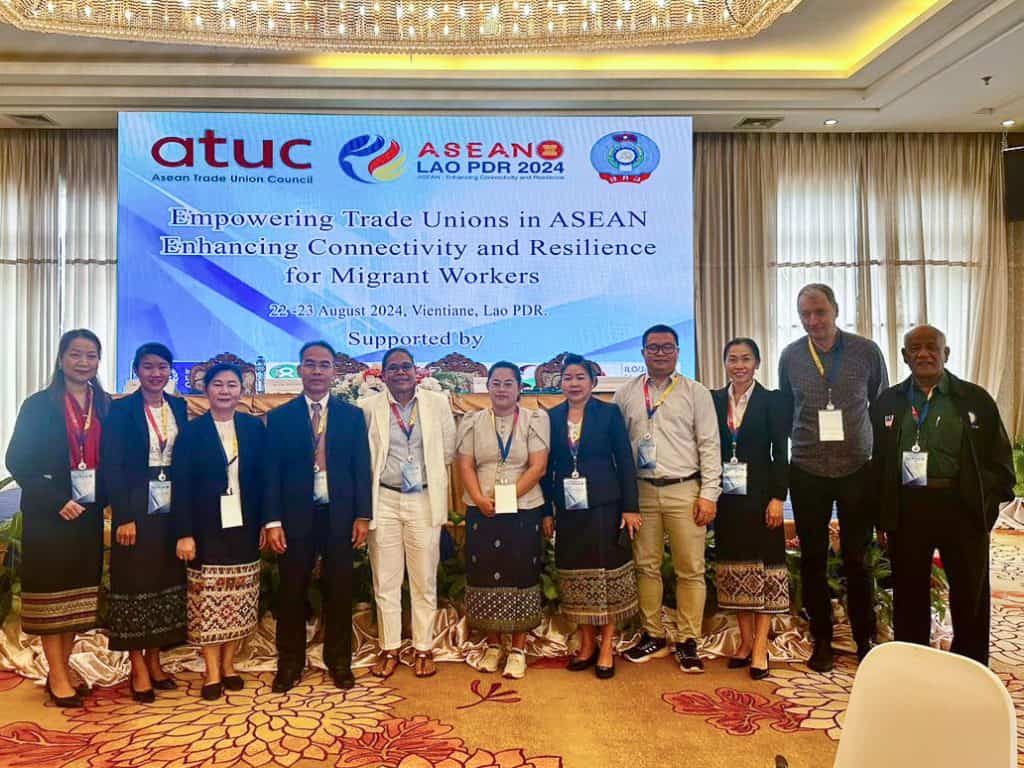
Union Aid Abroad-APHEDA team and ASEAN union leaders discussed migrant workers’ rights.
At a recent Association of Southeast Asian Nations (ASEAN) Trade Union Council meeting held in Laos, Union Aid Abroad-APHEDA took part in critical discussions on migrant workers’ rights and protection. The event, titled “Empowering Trade Unions in ASEAN and Enhancing Connectivity and Resilience for Migrant Workers,” brought together 19 unions from 11 ASEAN countries to tackle pressing issues affecting migrant workers across the region.
The meeting provided a platform for trade unions to share experiences in organising migrant workers and to advocate for the portability of union membership and social insurance across the region. This would ensure that as workers move between countries, their rights and protections follow them.
Union Aid Abroad-APHEDA’s teams from Laos and Timor-Leste, along with the asbestos ban campaign coordinator, presented best practices for supporting migrant workers, including a case study from Timor-Leste. A major focus was the vulnerability of migrant workers to asbestos exposure—a pressing concern that highlights the need for comprehensive regional action.

Vilada Phomduangsy, Country Manager, Union Aid Abroad-APHEDA Laos. Photo credit: LFTU.
Migrant workers’ asbestos exposure risks
Asbestos remains a silent killer in many industries, particularly those involving construction and manufacturing, where migrant workers are often employed. Despite its known dangers, the use of asbestos continues in various ASEAN countries, placing workers at risk of serious health issues, including lung cancer and asbestosis. The discussions emphasized the importance of addressing this issue through a unified regional approach.
Migrant workers are particularly vulnerable to asbestos exposure due to their socio-economic conditions. They often work in high-risk sectors, such as construction and demolition, under unsafe conditions that others might avoid. Known as the “3Ds”—Dirty, Dangerous, and Demanding—these jobs often come with lower pay, longer hours, and complex, risky tasks.
The lack of adequate worker protections exacerbates their vulnerability:
- Many migrant workers are not covered by Occupational Health and Safety (OHS) laws.
- Employers may evade responsibility for the long-term health consequences of asbestos exposure.
- Migrant workers might avoid reporting unsafe conditions due to fears of losing their jobs or facing deportation.
- Family members living on-site are also at increased risk.
- Language barriers can impede access to safety information.
- Access to compensation is often unequal.
Case studies highlight these risks: An Australian study of the Wittenoom asbestos mine (1943-1966) found that Italian migrant workers faced twice the exposure to asbestos compared to their Australian-born counterparts, resulting in a 67% higher risk of mesothelioma. In the United Arab Emirates, where migrant workers make up 80% of the labor force, exposure rates were notably high, especially among drivers.
The need for ASEAN-wide bans and action
Trade unions are crucial in leading the fight against asbestos exposure, having successfully advocated for bans in 70 countries. The meeting called for stronger hazardous labeling and a total asbestos ban to be prioritized on the ASEAN Labour Ministers’ agenda. By pushing for national bans across ASEAN, unions can protect workers’ health and enforce stricter regulations.
The collaborative spirit evident at the ASEAN trade union meeting underscores the necessity of cross-border solidarity in safeguarding workers. As unions continue to address the critical issue of asbestos exposure, their role in advocating for migrant workers’ health and safety remains vital.
—
29 August, 2024.
The Asbestos. Not here. Not anywhere. campaign receives support from the Australian Government through the Australian NGO Cooperation Program (ANCP).

